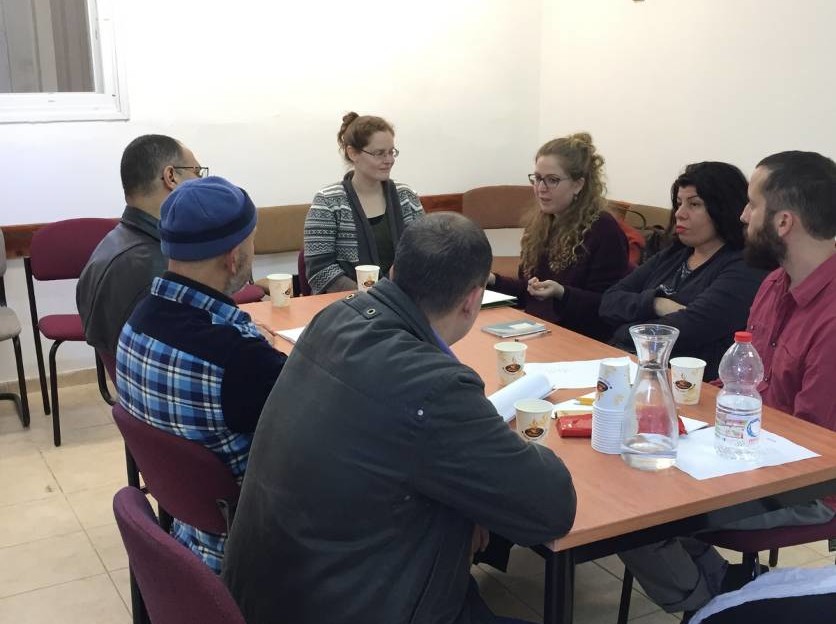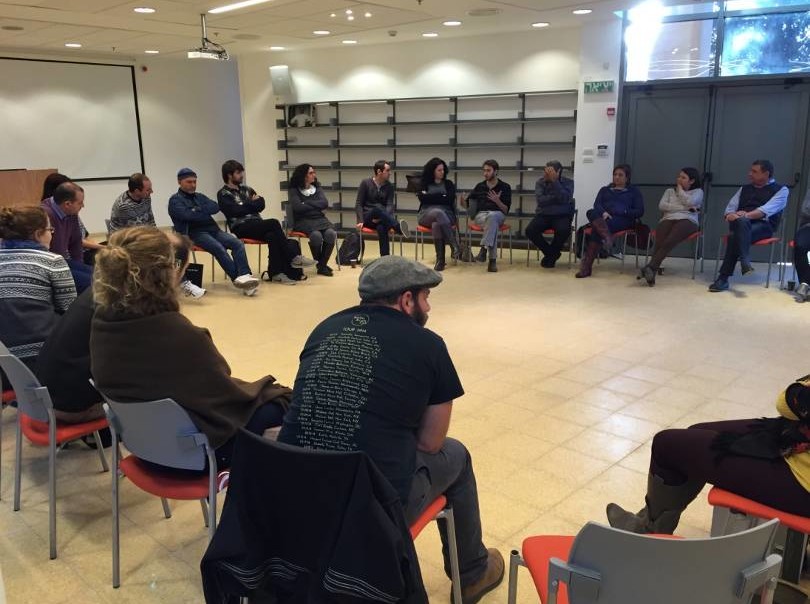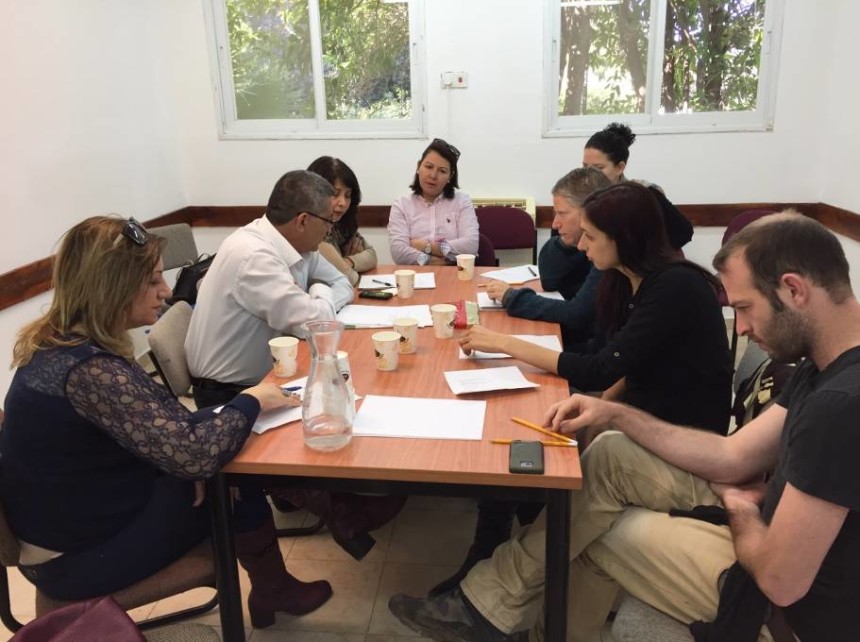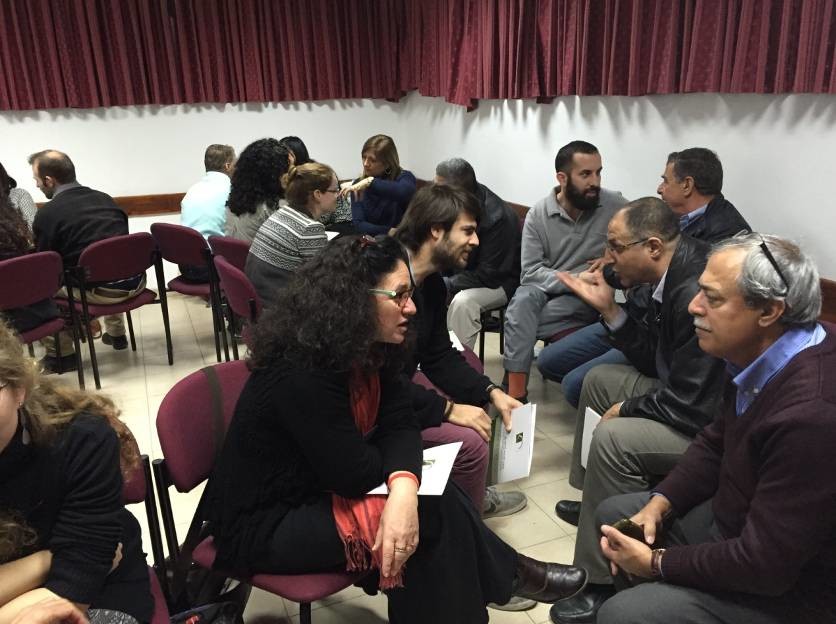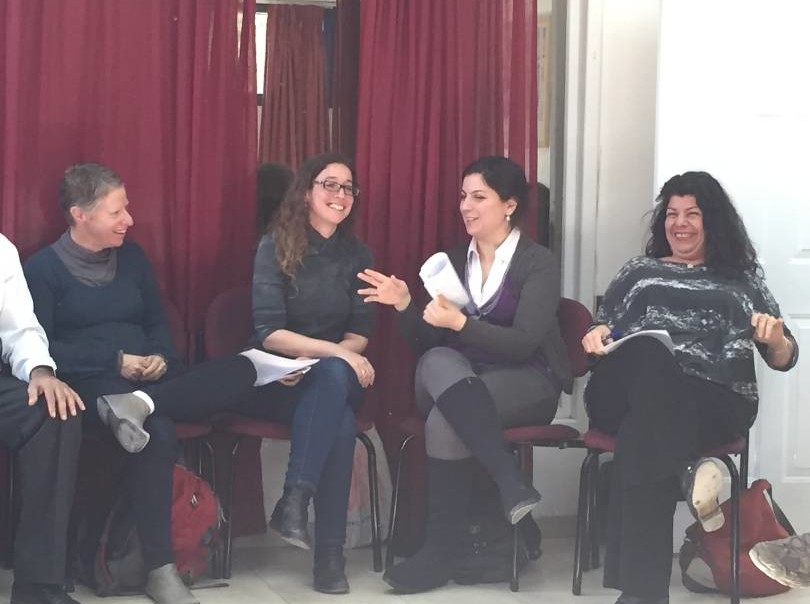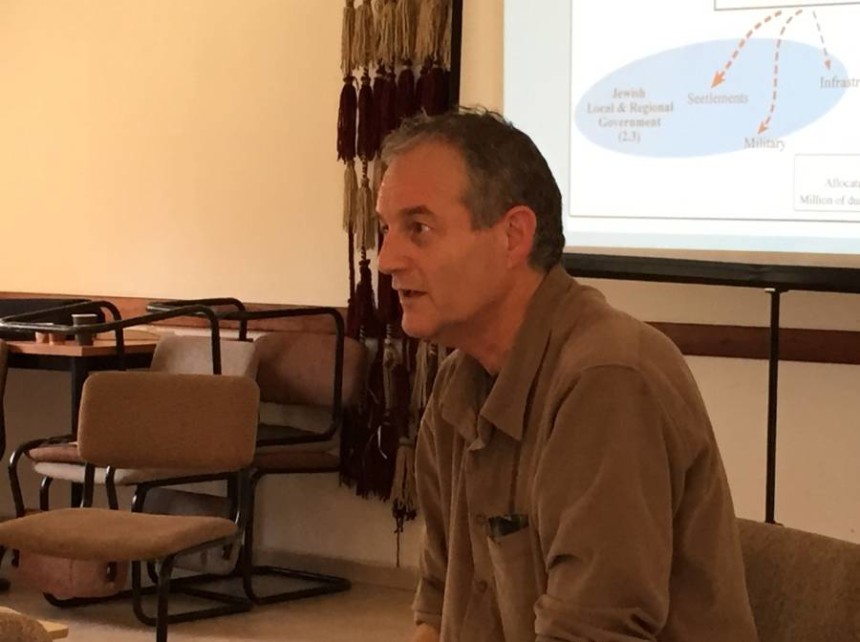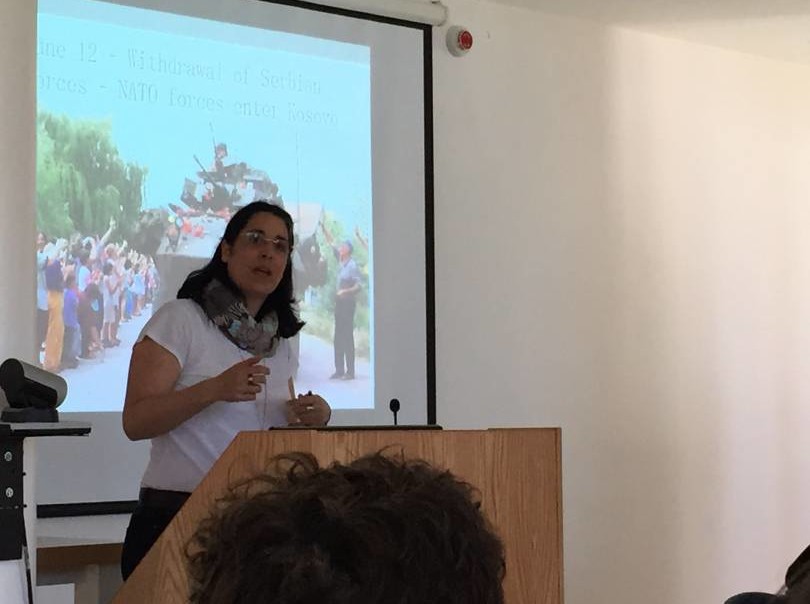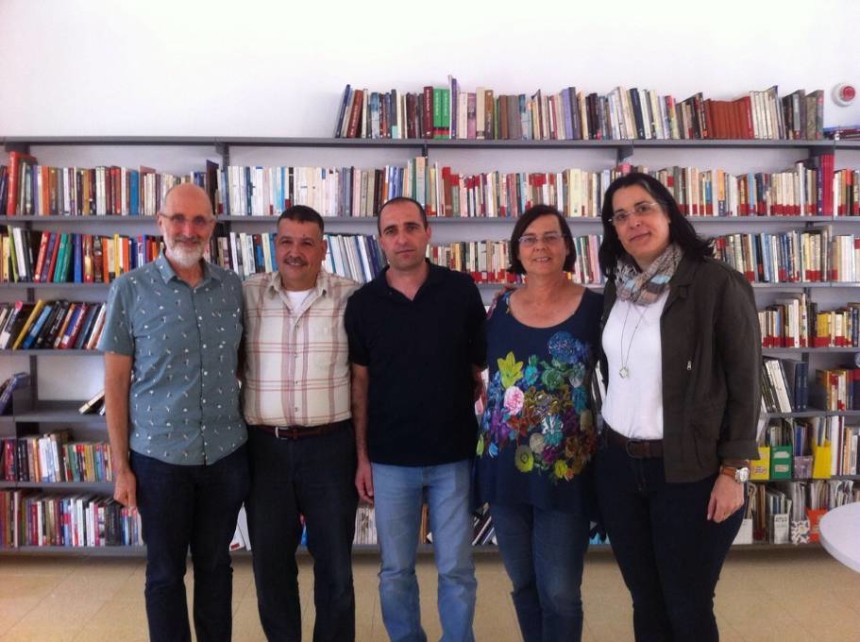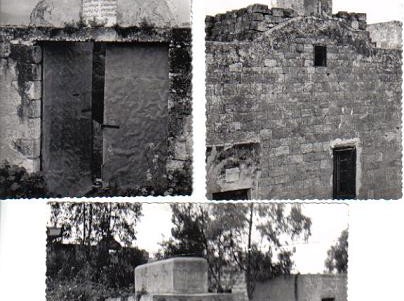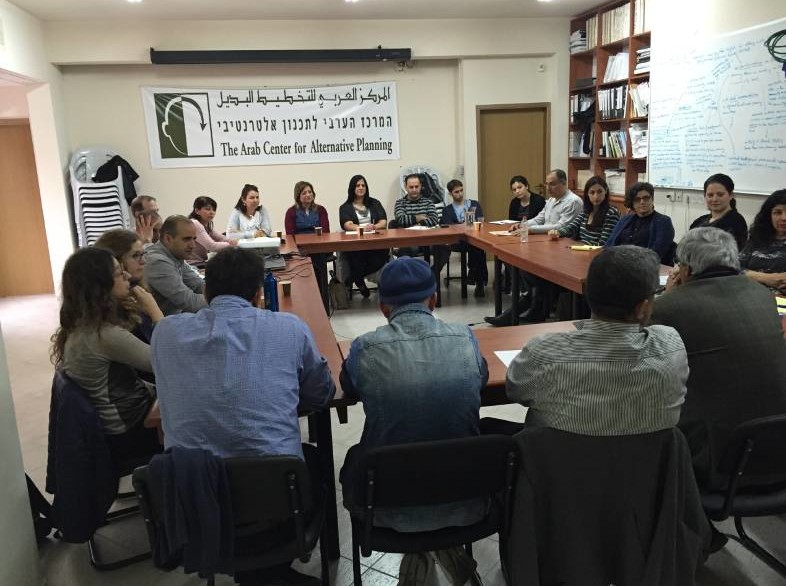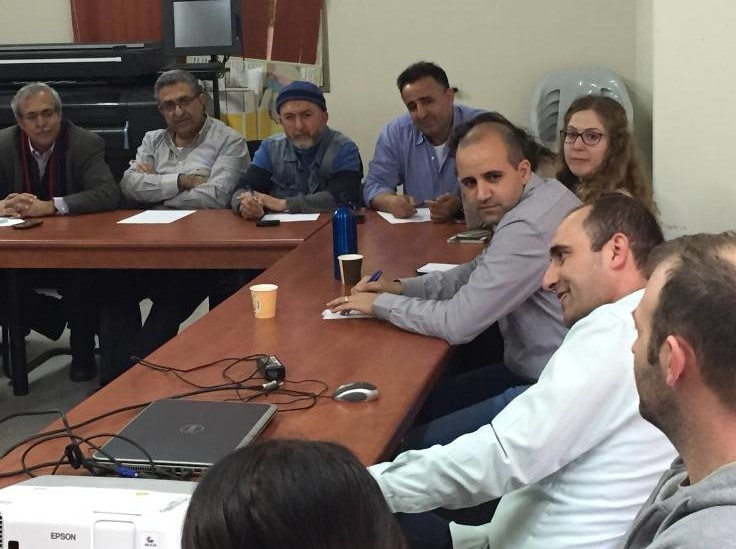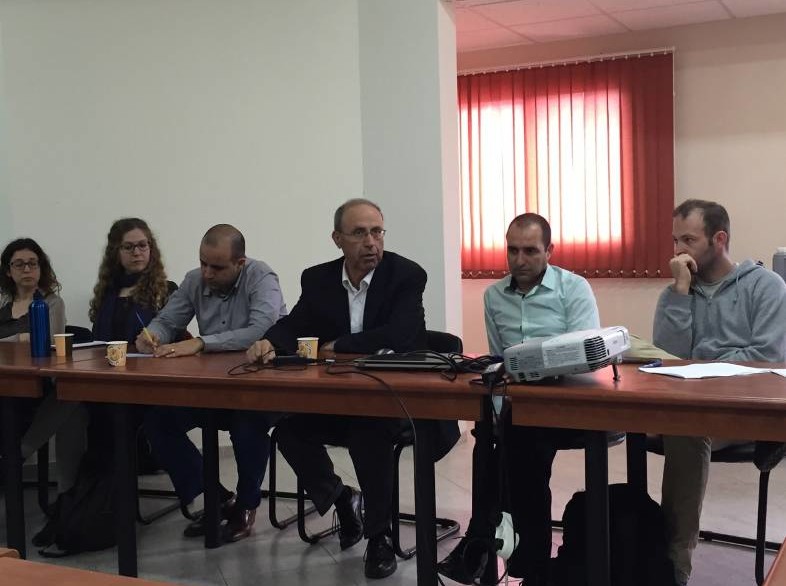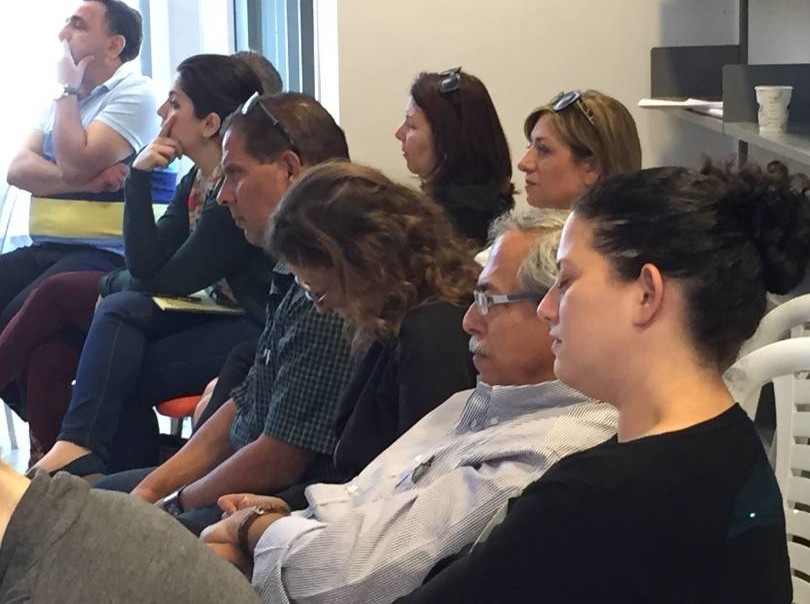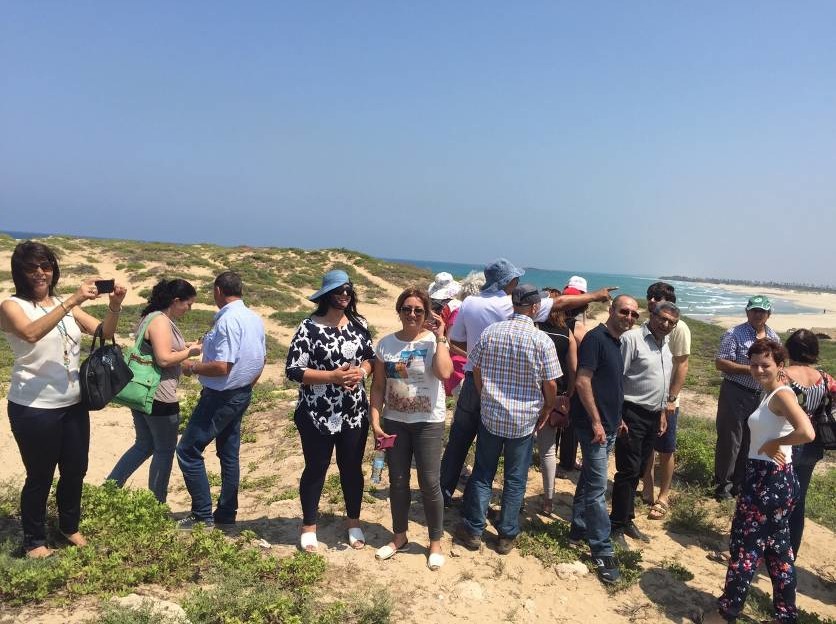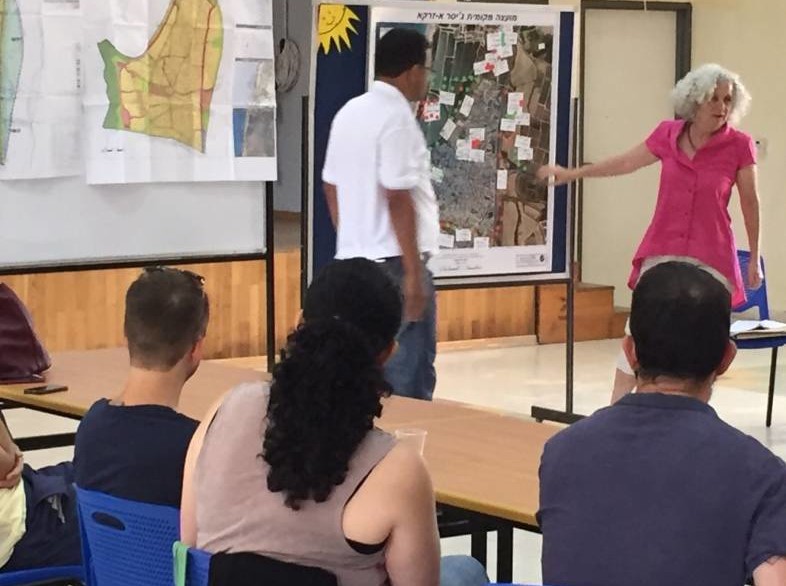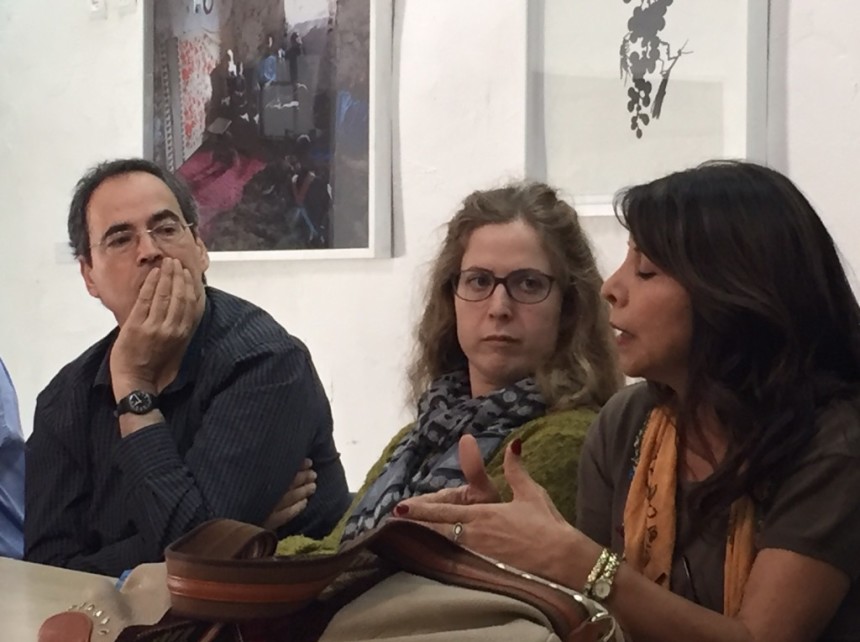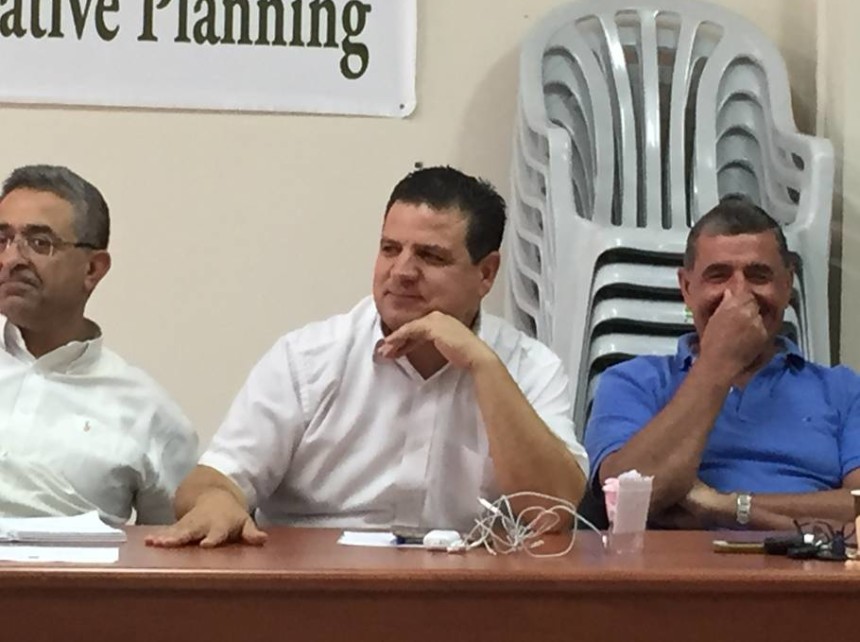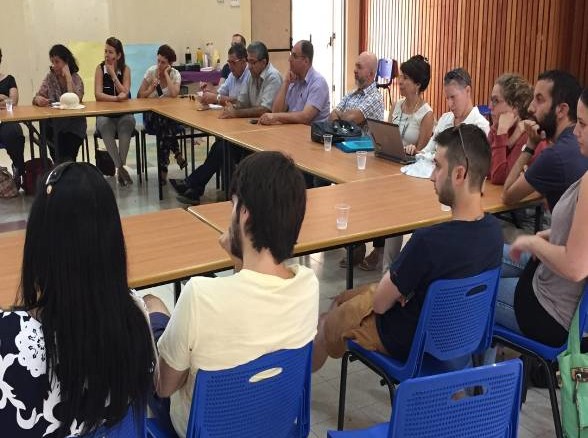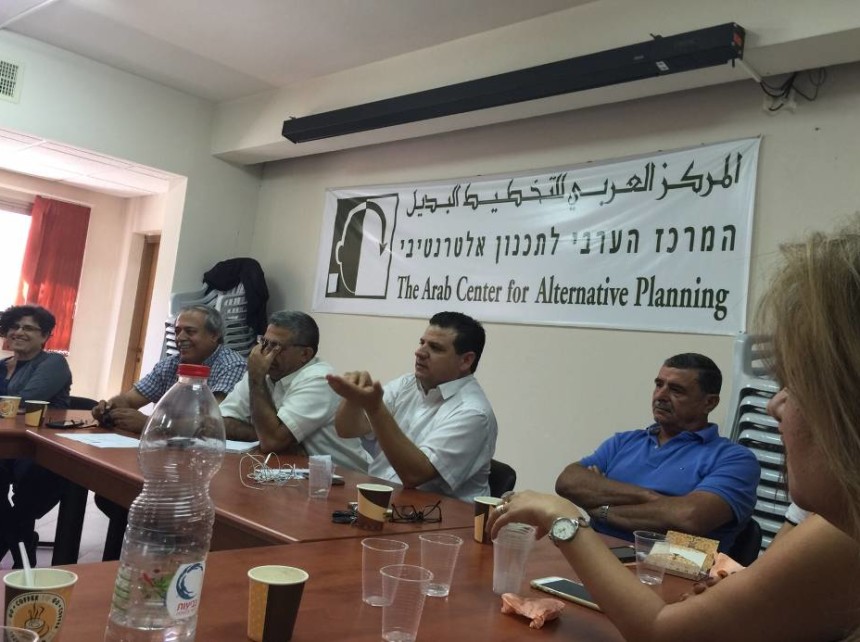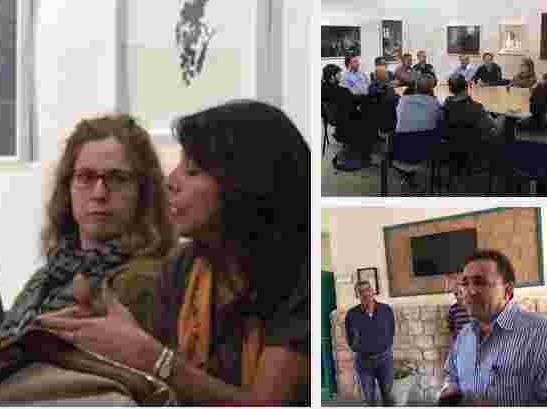The 2014-15 SFP Course for Urban Planners, Civil Engineers & Architects: a full report
A longterm Change Agents course has now come to its successful conclusion.
A new, similar, course will be beginning very soon.
This program was conducted by the School for Peace and Wahat al Salam-Neve Shalom in full partnership with the Arab Center for Alternative Planning in Elaboon. We spent several months recruiting participants and were very pleased to received 40 applicants from Arab and Jewish participants. Because of the tremendous interest, we decided to increase the number of participants in the course from the proposed 20 to 28; 13 Jews and 15 Arabs. The program had an equal balance of men and women participants for both Jewish and Palestinians. All the participants are professionals: 3 civil engineers, one of whom is on the local council of Kfar Kanna; 12 architects; a real estate appraiser; 8 urban planners; 2 lawyers that specialize in planning matters; and 2 environmental planners. The participants come from all areas of Israel and meetings take place at Wahat al-Salam – Neve Shalom (WASNS) and the Center for Alternative Planning in Elaboon.
[gview file=”https://sfpeace.org/wp-content/uploads/2016/02/planners-cs-2014-2015.pdf”]
We began the program with a 3-day workshop at WASNS on January 21st-23rd 2015. The workshop focused on intensive dialogue about the Arab-Jewish conflict, according to the SFP methodology. The program was coordinated by Dr. Nava Sonnenschein and Samer Swaid, Director of the Arab Center for Alternative Planning. Samer Swaid is a graduate of the SFP facilitator’s course. In the workshop the participants discussed a wide range of issues that are connected to the conflict: government limitation on the expansion of Arab villages and towns; issues of discrimination; differential budgets for Jewish and Arab municipalities; and issues involving the struggle between the democratic and Jewish nature of the State. They also discussed the fears of the Jews, racism, and more. On the third day of the workshop we held a simulated peace negotiation that dealt with future relations between Jews and Arabs in Israel. There were three subjects the Arabs and Jews negotiated on: land issues, questions of reconciliation, and issues concerning the character of the State. At the end of the simulation each negotiating group presented their insights and conclusions. This workshop gave the participants the opportunity to discuss the complex issues of the conflict in a sensitive fashion exposing a deeper understanding. For most of the Jewish participants, this was the first time they learned about the variety of obstacles and discrimination that the Arab community faces in urban planning. The group developed a “whatsapp” media messaging group for participants update one another on events related to the course and their areas of interest.
The second meeting of the program took place on February 27th at WASNS. The meeting began with a three-hour lecture by Prof. Oren Yiftachel, a specialist in political geography, from Ben Gurion University in the Negev. The enlightening lecture dealt with Israeli land planning regime as nationalization or dispossession and was followed by a discussion in which the participants covered a range of issues concerning land planning and Arab-Jewish relations. In his lecture Prof. Yftachel gave the background on the land issues of the Bedouins in the south of Israel. He spoke on the unrecognized villages and the legitimate demand of recognition of Bedouin ownership of their land. The participants were later given 6 articles and more comprehensive readings to broaden their understanding.
The third meeting took place at the Arab Center for Alternative Planning in Elaboon on March 13th 2015. The meeting began with a lecture by Dr. Hanna Swaid, a Member of the Knesset from the Hadash party who also founded the Arab Center for Alternative Planning. Dr. Swaid lectured on housing shortages in Arab towns and villages. In response to our requests he also spoke about the history of Elaboon during the war of ’48 – the Nakba. In 1948 a massacre was carried out in Elaboon by Israeli soldiers. All the residents were expelled/escaped and, in their case, were allowed to return after the involvement of the Vatican Church. The story stirred complicated feelings in the Jewish group who, after the meeting, researched facts about other historical events. The discovery of immoral acts during the time of the Nakba is difficult for the Jewish group and takes time to process and accept.
The fourth meeting took place on May 1st, International Workers Day. This meeting was attended by participants from another program of the SFP for community leaders and activists in mixed Jewish and Arab cities. For this meeting there were two lecturers who spoke about the dilemmas of mixed cities in times of conflict or post-conflict. Prof. Leslie Schwartz, from Stellenbosch University in Cape Town, spoke about dilemmas faced by Cape Town in becoming a city for all its residents, and Dr. Orly Friedman, from Belgrade, spoke about the dilemmas of coexistence in cities that have been through a bloody war.
After the lectures the participants split into groups based on where they lived and worked, and began developing ideas for joint projects that they could carry out. One group, for example, dealt with the situation in the mixed city of Lod.
Rasan Monayer, from the mixed cities program, presented the problems of a proposed plan that does not take into consideration the needs of the Arab community. In Lod there are 82,000 residents, of them 71.6% are Jewish and 28.4% are Arab. The participants from the planners program who work on the Tel Aviv Municipal Council, offered to review the proposed plan and suggest alternatives. An idea was raised for a project in the village Jisr Az-Zarqa. The village is the only coastal Arab village that survived the Nakba. The problem is that there is no space for the village to expand.
In the fifth meeting we decided to devote more time to dialogue; to tour the city of Lod; and to think creatively about the projects that the group would like to carry out. The tour took place on a Thursday afternoon and was led by Rasan Monayer, a member of the Lod City Council, and Arafat Medhamesh, who spoke about the problem in his village, which borders Lod. After the tour the group returned to WASNS. The next day we held the sessions, two mixed with Jewish and Arab participants (bi-national) sessions and one session with each group alone (uni-national). The uni-national session provides an opportunity for each group to express themselves freely and confront difficult issues. In this process there is some recognition and solidarity expressed by the Jews for the Arab group. The Jewish group is also given the opportunity to check and deal with information that they find difficult to accept. In an afternoon session we discussed projects that participants wanted to develop. Four project groups were initiated. One group wants to offer their skills to build a plan for an unrecognized Bedouin village in the south. A second group will deal with a project in Jisr az-Zarqa and is planning to organize a special workshop for planning in that village. A third group will deal with the proposed city plan in Lod by tackling the problematic aspects. The current strategy is to delay the planning committee’s decision until the group can develop alternative plans. The fourth group is working on the topic of setting up a center for memorializing the Nakba.
The dialogue during these meeting was very important to the participants as it is a difficult time of Arab-Jewish relations in Israel and participants needed to better understand and appreciate each other’s views.
Site-Visit to Jisr az-Zarqa
On July 31, 2015 the group visited the town of Jisr az-Zarqa. We chose to visit Jisr az-Zarqa because a group of the course participants is working to improve the village’s expansion plan. The visit was organized by Prof. Ayala Ronel, an architect and a faculty member of the University of Tel Aviv. Prof. Ronel and the town’s planner Mr. Yakub Jubran received the group and explained the planning issues of the town. At the end of the meeting, the group members sat to coordinate their further work on the project.
On September 18th the group met at Neve Shalom/ Wahat Al Salam. Enaya Banna, who participated in the course, gave a lecture on the development of the land issues in the Arab villages and towns in the past, present, and future. After the lecture we discussed the current planning issues. The participants said that they wanted to hear more about the political situation. We planned the following meetings in order to address these needs. That afternoon people sat in teams to discuss the different projects they are working on.
On October 16, 2015 we met in The Arab Center of Alternative Planning. The meeting included a dialogue about the current violence and the frustration people felt as a result of the situation. Member of Knesset and head of the Joint List, Ayman Odeh discussed with the group his experience in the parliament and his opinions on the current political situation. The group was very interested and asked many questions. In the second half of the day, the group worked on the projects that they are involved in.
Site-visit to Sakhnin
The meeting on 27th November was conducted in the Environmental Study Center in the Arab City of Sakhnin. The group toured the special ecological building with architect Abed Yassin, who participated in the course. He designed the building using many Muslim architectural elements, natural materials and other environmental elements. After the tour we heard a lecture by Professor Gadi Elgazi, of Department of History, Tel Aviv University, and senior editor of the Journal of History & Memory. The lecture was an analysis of the conflict from the perspective of ‘natives and the settlers’. The lecture was followed by a group discussion.
On February 5th and 6th , the group met in Nazareth for the final meeting of the program with a great deal of excitement and feelings of remorse that the course was ending. After the group came together we toured the City of Nazareth with Dr. Sharif Sharif, Director of Building Preservation for the City. We heard about the history of the city and saw the art that has developed in there. In the afternoon we heard a lecture from Alaa Gantus, accountant and economic advisor to the Committee of Heads of Arab Towns. He discussed the new economic development plan for the Arab sector that is presently being proposed by the government. The lecture was informative and the proposal reflects the investment by Arab legislators in developing a compressive approach. Following the lecture we discussed the current situation in the country and initiatives that participants have begun to advance in their places they work. Enaya Banna, a Palestinian planner, spoke about her new position as the Chief Engineer for Planning in the Wadi Ara region. Yasmin Coptie talked about her efforts in the Technion where she works. Shlomit Sonnenstein, talked about how she is leading the fight to advance a bilingual Jewish-Arab school in Jaffa. Yael Efrat, who is a director in the Society for Nature Preservation, decided to share agricultural land of hers with a Palestinian women.
On the final day, we summarized the course and discussed how participants can continue with projects they began and new initiatives were suggested. Two participants took responsibility to continue to call meetings of the group and they decided to keep in contact through the ‘what’sapp’ group they started. Participants filled out program evaluation forms.
Participants Projects:
The participants worked on a number of projects and will continue working on them into 2016. These include:
- Filing an objection to the Area Planning Council in Lod opposing the proposed city plan, because it does not take into account the natural growth of the Arab population in the city. The plan’s approval is still pending,
- Planning a playground for children in the Bedouin City of Rahat,
- Developing alternative ideas for the city plan of the Arab costal village of Jisr az-Zarqa, which suffers from a serious lack of housing and is unable to expand,
- Brainstorming about the idea of developing a Palestinian heritage museum to be located in the Galilee.
Program Evaluation
Participant’s Feedback in Summary Focus Group
M: Palestinian landscape architect:
I have gone through a process. Before this course I did not understand things in depth, I was not political, I always ignored politics. Now I have a deep understanding and feel that I have the responsibility and ability to contribute. Today I understand more about the need to continue with more groups [like this one]. I always asked ‘what will come from this?’, particularly in the first meeting. Today I see what it contributes and I welcome the initiative.
N: Palestinian civil engineer:
I feel that this course is an introduction for me into a world that I did not specialize in. In order to achieve something, more needs to be done, and I got several tips on how to look at planning if I am in the district planning committee, and how to discuss and present. We should insist and not stop. We need to continue and not stop.
Y: Palestinian landscape architect:
I met people from both nationalities that I really connected to. There are colleagues that can help me and I am certain that when we meet in the future I will be confident that I have partners that are ready to fully engage in the struggle for justice. In terms of the practical aspects of the course, we needed to go into more depth. I am very happy I took part in this course and I recommend it to others.
H: Jewish civil lawyer representing nature protection in regional planning committees:
Despite the fact I know where I live, there were many points that were eye opening and new to me. I have always tried to make changes in my small circle. I have a Palestinian friend, and I decided to share the land I have in my village with her. I would like to hear more success stories to hear about what is working and what is not.
N: Jewish architect:
The course allowed me to break out of the dry bubble of urban planning. At some stage I realized the way to impact through planning. We need to gradually challenge planning rules until the wheels of this system move. I understand that some things need to be done in parallel and at times we may need to work on the boundaries of legality.
D: Jewish architect:
I really developed over this last year. In work I began to work on bigger projects. I want to take more responsibility and to get inspiration from those who already achieved something. My dream for the future is to work on joint actions. It isn’t enough to just be an architect; maybe in the end I will be a change agent. I feel that I do too much of what the municipality tells me and it creates a sense of disgust because the municipality has limited considerations. I don’t know if the Knesset is the place I’ll end up.
E: Jewish student of architecture:
I gained a lot on the personal level. I have privilege (as a Jew), and I can fully choose not to relate to it. This was clear in all our meetings and in each discussion; the topic was on my mind and made me think about things differently. For this alone it was worth coming. Another thing, the most important benefit from the course is the connections that we created. As everyone reaches the professional world, we need these connections and need to meet more often to initiate things together.
I: Jewish architect:
The program aims to have professionals take a political stand and positions and create change. As a director of planning in Tel-Aviv – Jaffa, I want to stay in my position because I have a mission there. I think more people should taken these positions, rather than going into the private sector, so that they can find bring about important and needed change.
A: Palestinian participant
The situation in Qalansawe influenced me to come here. I found a supportive group; I gained a lot of knowledge personally from individuals and the group. I am moved by the wonderful people, and the lecturers were wonderful too (like Oren Yiftahel). They gave me the support I needed to continue. I do what I believe in, even if I do not see results, and thank god there are results. In terms of the Jews, I felt they lacked knowledge of the relationship between the government and the Arabs. The work inspired me. I understood that in order to gain rights we need to train really great planners, to train lawyers that can deal with planners. Two weeks ago they destroyed a 350 meter house in Qalansawe. It is very painful for me. If we appeal the destruction, I will let the group know.
I thank everyone here. It was interesting and moving, and I always say that you never lose if you believe in what you do.
Participants Recommendations for Future Programs:
- It is important to provide support after the course and to have additional meetings
- The planning process takes a long time. It can be helpful to have shorter, more intense, and focused meetings similar to the one we did at Jisr az-Zarqa.
- When we visit sites and discuss planning issues, it would be helpful to meet with residents and hear from them regarding how the issues affect them.
- It is very important to bring successful case studies involving social change in policy issues.
- It is suggested that we have fewer projects and focus in greater depth on the projects that we do carry out.
- The site visits were very good and helped in understanding the issues.


